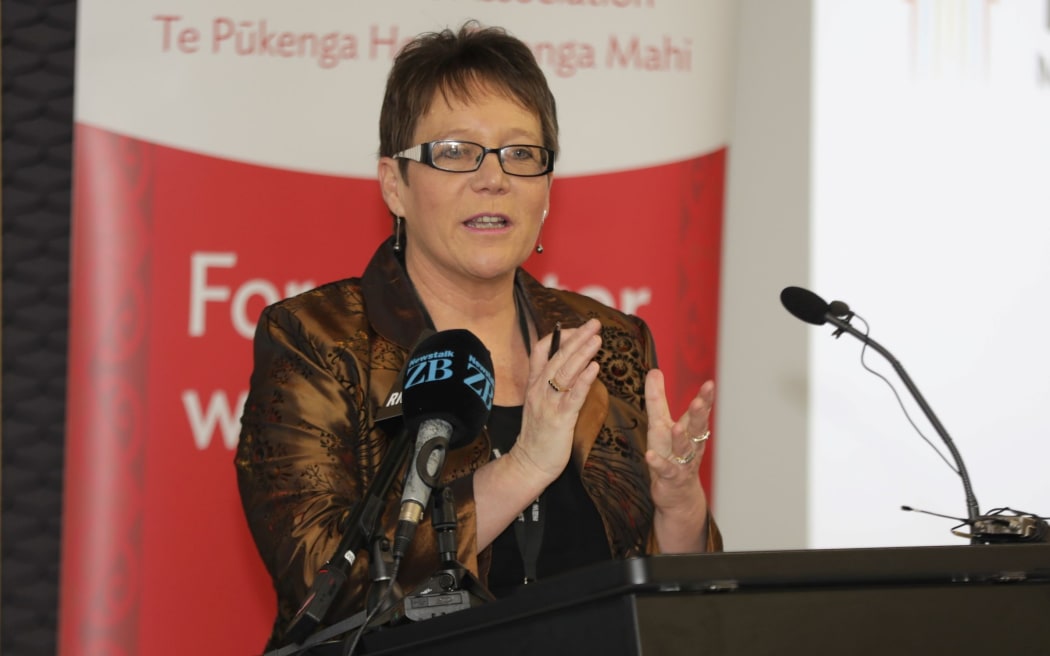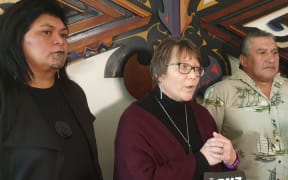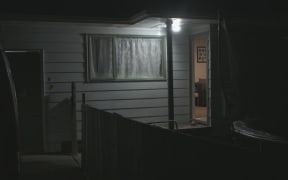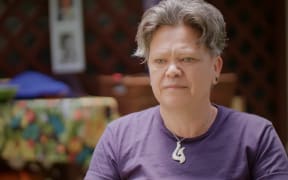Oranga Tamariki's inquiry into its attempt to take a newborn baby from its mother at Hawke's Bay Hospital will not be released to the public in full.

Minister for Children Tracey Martin. Photo: RNZ / Rebekah Parsons-King
Last month, the hospital was put into lockdown when a standoff ensued between social workers and whanau of the 19-year-old mother. It sparked widespread complaints about the organisation's practice of removing Māori babies from their whanau.
Oranga Tamariki says an independent person will oversee the inquiry, but it's not been decided who that will be.
Minister for Children Tracey Martin said: "The internal inquiry will have the chief social worker as the organisational lead but iwi have agreed on an independent person of Ngāti Kahungunu descent to have oversight over the inquiry and certain iwi leaders will be ... the conduits to the whanau to make sure they are well supported.
"The whanau is now happy to have the inquiry. What the mum has said is 'I want a home, I want my babies back and I'd like OT (Oranga Tamariki) out of my life'. Everything else that has gone on around them has been quite overwhelming.
"This will be about their family and their circumstances so there will be a level of information that is theirs, that is their information. If they choose to release it, that's their business.
"I'm not suggesting that Oranga Tamariki is going to put out into the public domain information about this particular family.
"There may be a level of information that should come out into the public domain. But certainly there won't be a level of information that gets into this family's business and we put it out for the world to see."
Ms Martin said there was the same level of racism and unconscious bias inside Oranga Tamariki as the rest of the country.
"Oranga Tamariki workers don't drop out of the sky, they are New Zealanders. They come out of our communities. They come out of our Māori communities, our pākehā communities and our other communities.
"We are recognising across New Zealand that we have a problem with racism and unconscious bias. Is Oranga Tamariki responsible for making sure that they work to correct that inside their organisation? Absolutely they are.
"Just in the same way that every other organisation and we as a nation have to take responsibility for working on that."
Ms Martin said wholesale change in the system was identified as required in 2015, leading to the 2017 establishment of Oranga Tamariki.
"Oranga Tamariki was always going to take five years to make a complete systematic shift. We just announced $1.1 billion to do that. It has been moving in the right direction. We have been piloting strategic alliances with iwis to change the way that the system works for Māori"
She said calling the situation of three Māori babies being taken a week "New Zealand's own stolen generation" was inappropriate, in her view.
"I think it completely devalues what happened to the Aboriginal people, the indigenous people of Australia, which was set in legislation to destroy their culture. Secondly, it also totally misrepresents what is happening right now with regard to Oranga Tamariki and the relationship with Māori...
"We have got to work together so that our families don't find themselves in a place that their children need to be taken into care. We need to start earlier so that Oranga Tamariki is not having to show up at the door."
Crown and Māori Relations Minister Kelvin Davis also said unconscious bias wasn't limited to government agencies - it was in all parts of the community.
Mr Davis attended a meeting alongside Ms Martin, Ngāti Kahungunu and the Māori Council in Hastings yesterday, where the internal inquiry into the attempted removal of the six-day-old baby from Hawke's Bay Hospital was announced.
Mr Davis said part of his job was to eliminate unconscious bias.
"There's unconscious bias in all parts of the system, so not just the system, out in communities," he said.
"It's not limited to government agencies, and like I say it's part of my role where it exists in government agencies to address it and try and eliminate it."
Whitewash
The mother's midwife, Jean Te Huia, and her lawyer, Janet Mason, say an agency investigating itself is not likely to result in meaningful change, and are calling for an independent inquiry.
Ms Te Huia believed the report would be a whitewash.
"Merely having an internal inquiry where only a few people know the outcome because they're presumably keeping private information about people, to me it's just a whitewash."
She said there were many mothers out there who have had their babies taken away and are voiceless.
"It's a silent, silent crisis. We're talking about a government agency that is funded by taxpayers money that affects all of these people and at the moment they are voiceless."
Ms Mason said "It in no way satisfies a great need in particular from Māori for this situation to stop...
"Any initiative undertaken by the state to set up a complaints authority I don't think will be very useful because this issue has been going on for a very long time. It's been intergenerational for Māori and there is very, very little trust in relation to the state."
Another review
Children's Commissioner, Judge Andrew Becroft, has announced a review of Oranga Tamariki's care and protection of Māori babies from birth to three months old.
Today I have announced my Office will be carrying out a thematic review of Oranga Tamariki’s decision-making relating to care and protection issues for tamariki Māori aged 0-3 months.
— Children's Commissioner NZ (@ChildrensCommNZ) June 16, 2019
"When you look at the stats, you can well understand the concern. For example, Māori children in care have increased and are increasing since 2000 consistently. Babies removed at birth gone from two a week to three a week in the last four years although dropped ever so slightly last year.
"You can well understand why people use that term, alarm bells should be going off throughout New Zealand when that term - coined in Australia with a different legislative setting - is being applied here. We ought to be concerned, that's one of the reasons that we're undertaking this review.
"What was the old Child, Youth and Family was broken. It was reactive, it was SOS emergency, ambulance at the bottom of the cliff, highly interventionist. The new model is early intervention, work with hapu and iwi for indigenous Māori children ... what is dreamed of in the new legislation is nothing short of a revolution.
"The national office want to bring about change and mean business. But I also know for children at the coal face throughout the country the change isn't yet being seen.
"The new model kicks in 1 July. As from 1 July, that's less than a few weeks away, the revolution has got to start taking place."
He said New Zealand could not "shrink from the fact in New Zealand that there is a long term legacy of colonisation that exists and disadvantages and there is modern day unconscious bias and systemic disadvantage".
The same things were said in 1988 and led to Child, Youth and Family Services, he said.
"Everything was meant to change back in 1989... that is why this is a second chance for a revolution that we blew back in 1989."
More money needed to go to both state and Māori to make change, as well as structural change including "delegation and devolution" - as well as decolonisation.
The new chief executive of Oranga Tamariki, Grianne Moss, had a "massive job", he said.
"It's the most broken system frankly imaginable that was inherited ... all I know is the challenge is enormous, principally at the feet of the government and Oranga Tamariki. But we all need to be involved ... we can't settle for another shattered dream that didn't deliver.
"This has got to be our chance in this generation to make sure there is an enduring difference to make sure that every child in New Zealand is loved and nourished."





